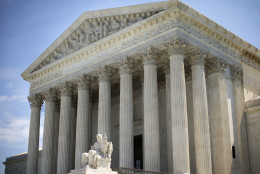Supreme Court
-
My first thought on seeing the news on my smartphone with near-simultaneous alerts from four major news organizations: Oh, here comes another ugly battle in Washington.
February 15, 2016 -
Ralph White, the Government Accountability Office’s managing associate general counsel for procurement law, said two federal acquisition cases went to the Supreme Court over the last year as part of an atypical fiscal 2015 for federal bid protests.
December 18, 2015 -
The Veterans Affairs Department’s Vets First program is taking center stage before the nine justices over whether it applies to the general supply schedule programs.
December 07, 2015 -
The Supreme Court only hears a few dozen cases a year. But one on the docket will answer big questions around contracting practices by the Department of Veterans Affairs. The question for the court is does the VA have to give preference to veteran-owned small businesses in all instances? Steve Koprince, managing partner of Koprince Law, tells In Depth with Francis Rose about the case's potential impact.
July 02, 2015 -
WASHINGTON (AP) — The Supreme Court will decide whether the U.S. Department of Veterans Affairs is complying with a law designed to increase the number of federal contracts awarded to small businesses owned by disabled…
June 23, 2015 -
The Supreme Court makes a decision today on a whistleblowing case at the Homeland Security Department. DHS fired an air marshal for blowing the whistle on the Transportation Security Administration after it canceled overnight missions during a hijacking alert. Mathew Tully is a founding partner at the law firm Tully Rinckey. On In Depth with Francis Rose, he explained the details of the case.
January 21, 2015 -
The Supreme Court upheld an appeals court's decision that Robert MacLean is eligible for whistleblower protection. The TSA fired the former air marshal for leaking information to the media.
January 21, 2015 -
The Supreme Court ruled Wednesday that a former air marshal who was fired after leaking plans to the media about security cutbacks can seek whistleblower protection.
January 21, 2015 -
The Supreme Court is set to hear the case of a former Federal Air Marshal turned whistleblower on Nov. 4. Robert MacLean was fired after he told the media about the Transportation Security Administration's decision to use fewer air marshals on long distance flights. This is the first case the Supreme Court will hear that directly involves a federal whistleblower. Matt Tully, founding partner of the law firm Tully Rinckey, joined Tom Temin on the Federal Drive with details.
October 20, 2014 -
The Service to America Medals honor federal employees who go above and beyond their job descriptions to serve the public. For the next few months, Federal News Radio will speak to the finalists. When the Justice Department has a big case before the Supreme Court there's one man it turns to over and over again. Ed Kneedler has argued 125 cases before the high court, a record among today's lawyers. He's defended the government's positions on the Affordable Care Act, on a controversial Arizona immigration law and even in the Elian Gonzalez case during the Clinton Administration. Deputy Solicitor General Ed Kneedler joined Tom Temin and Emily Kopp on the Federal Drive to discuss his Sammies nomination.
August 04, 2014 -
The Supreme Court has ruled to curb the President's power to make recess appoints. Basically, the court says the Senate has to really be in recess. And even if it's only keeping the lights on for light business and blocking appointments, that means it is open. John Elwood is a partner at the law firm Vinson & Elkins. As a former Justice assistant solicitor general and White House Counsel, he's argued seven cases before the Supreme Court. He joined Tom Temin on the Federal Drive to discuss what the ruling means for future appointees.
June 27, 2014 -
On this week's Capital Impact show, Bloomberg Government analysts discuss how the debt limit and furloughs are affecting the economy, and how a case being reviewed by the Supreme Court, could impact future elections. October 10, 2013
October 10, 2013 -
The Supreme Court says a Virginia law can't override a federal employee's decision to make his ex-wife, not his wife, his beneficiary in a federal insurance program.
June 04, 2013 -
The U.S. Court of Appeals for the Federal Circuit in October ordered Congress to pay six federal judges years of back pay.
December 14, 2012 -
The Supreme Court ruled Monday that federal employees can appeal decisions of the Merit Systems Protection Board stemming from discrimination-related complaints in federal district court. The ruling follows earlier lower court decisions that required employee appeals to go solely through the U.S. Court of Appeals for the Federal Circuit. The justices' decision applies to federal employees filing "mixed cases" — complaints involving both allegations of wrongful termination and job discrimination — under the Civil Service Reform Act.
December 10, 2012







